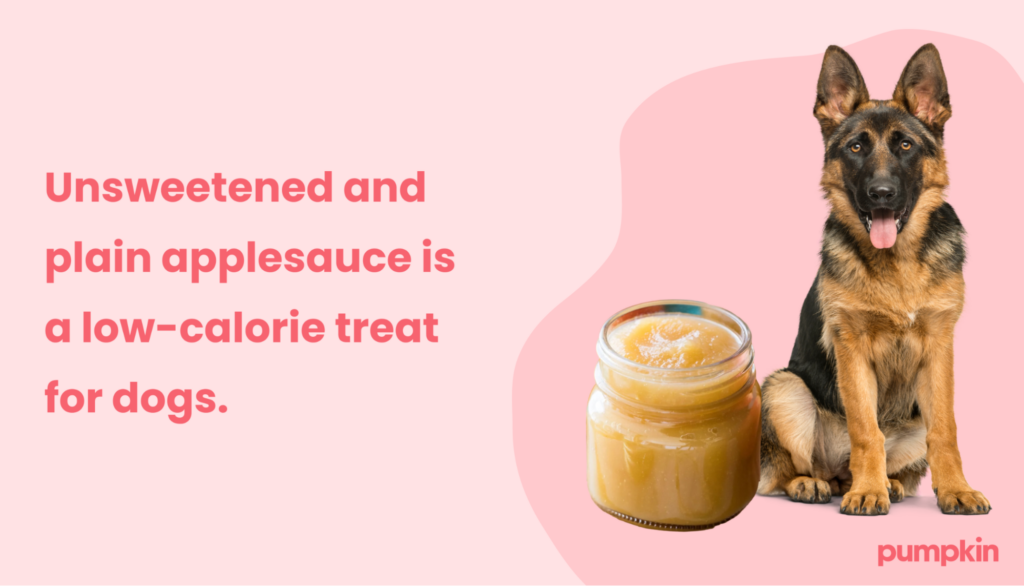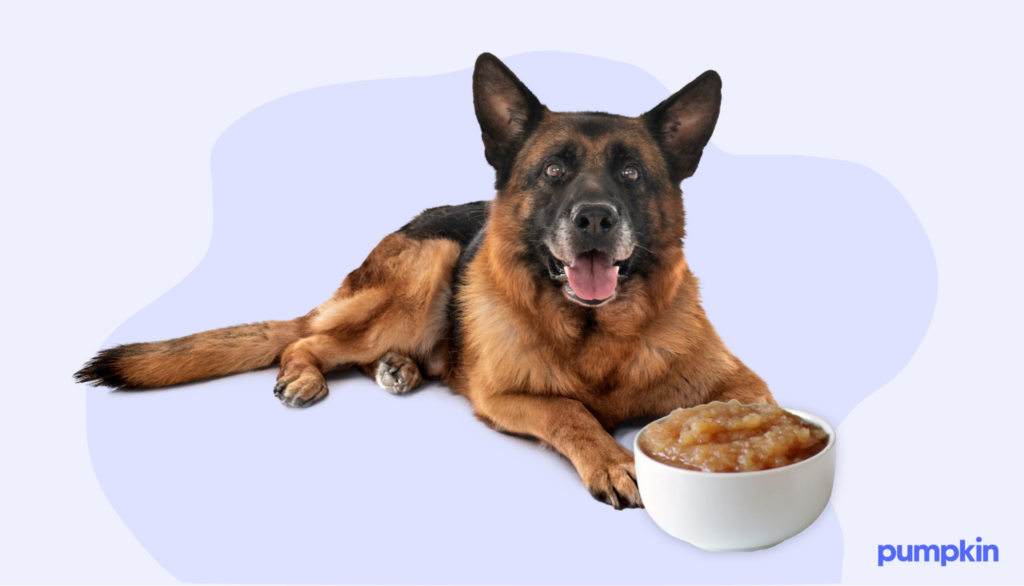Key Points
- Applesauce can be good for dogs in moderation, but it needs to be served plain.
- Applesauce has high water content, which helps keep your pup hydrated.
- When introducing new foods, always start with a small amount to make sure there are no bad reactions.
If you’re looking for something to do with excess apples, or just prefer your fruits smooth instead of crunchy — applesauce may be your go-to. This versatile snack can be used in desserts, savory dishes, and even… dog food?
Yes, dogs can eat applesauce in moderation. As long as it’s plain and free from harmful additives, most pups can enjoy this tasty treat.
Want to know more about the benefits and risks of applesauce for your canine companion? Keep reading to discover everything you need to know about applesauce and dogs.
Is applesauce safe for dogs?
Just like feeding your dog apples, applesauce can be a tasty and nutritious addition to your dog’s diet.
Rich in antioxidants and vitamins, applesauce can support your dog’s immune system and overall health. However, there are a few things to be aware of:
- Opt for homemade or unsweetened varieties to avoid added sugars and artificial sweeteners, which can be harmful to dogs.
- Share with your pup in moderation, matching portion size to their daily calorie allowance.
- Talk to your veterinarian when introducing your dog to new foods, including applesauce, into your dog’s diet.
How much applesauce can I give my dog?
The amount of applesauce you can safely give to your dog depends on various factors, including your dog’s size, overall health, and individual tolerance.
As a general guideline:
- Small dogs: a teaspoon to a tablespoon of applesauce as an occasional treat is generally safe.
- Medium to large dogs: can have a slightly larger amount, up to a few spoonfuls.
As with all extra treats, it’s important to monitor their overall diet to avoid excessive calorie intake.
What are the health benefits of applesauce?
Applesauce comes with a range of potential benefits for your dog, including vitamins and nutrients. The list of benefits includes:
- Vitamin C: helps combat oxidative stress and supports your dog’s immune system
- Vitamin A: promotes good vision and skin health
- Fiber: aids in regular bowel movements and is beneficial for constipation
- Low-calorie: ideal for dogs on a calorie-controlled diet or to regulate blood sugar
- Training treats: can be a healthier alternative to some commercial treats
- Oral health: can encourage saliva production and reduce plaque buildup

While this snack has benefits, it’s crucial to share applesauce in moderation and consider individual factors such as your dog’s size, health status, and dietary requirements.
What are the risks of applesauce for dogs?
Like any human food, applesauce isn’t risk-free. Apples contain natural sugar, and too much sugar is bad for your dog’s teeth. And if your pup has diabetes, your vet may recommend keeping apples and applesauce off the menu.
Although it’s very rare, some dogs also have allergies to fruits. If your pup experiences any of the following symptoms, stop feeding them applesauce and check in with your vet:
- Skin irritations and itching
- Ear infections
- Vomiting or diarrhea
- Hair loss
- Red eyes
- Fatigue
Remember, you should always choose unsweetened or homemade applesauce to avoid added sugars and toxic artificial sweeteners such as xylitol.
If your dog has a bad reaction to a new food, a trip to the vet may be in order. When unexpected accidents or illnesses strike, Pumpkin Pet Insurance plans can help reduce the cost of eligible vet bills, protecting both your pup and your finances.
Consider plain apples instead
Why not go back to basics and serve your dog plain apples instead of applesauce? Simply remove the skin, core, and apple seeds, then chop them into bite-sized pieces.
Raw apples can be served to your dog in moderation, and you don’t have to worry about the mess that comes with cooking and pureeing fruit.
However, if you have a senior dog or a teething puppy, pureed applesauce may still be the best choice.
Is applesauce safe for puppies?
Once your pup is on a solid diet, they can eat applesauce in moderation. For most dogs, this is after 4-6 weeks of age. If your puppy is teething, applesauce can be given as a frozen treat to soothe sore gums.
How to serve applesauce to your dog
Homemade applesauce is the best option for your pet, as you have full control over the ingredients. You can make a simple batch using fresh apples, water, and a bit of lemon juice.
If you’re purchasing from a store, look for unsweetened applesauce brands. Check the ingredient list to ensure there are no added sugars or artificial sweeteners. Not all flavorings and spices are safe for dogs. For instance, while cinnamon is safe for dogs (and even beneficial), nutmeg is toxic.

To share pup-friendly applesauce with your pooch, consider freezing a portion of applesauce in an ice cube tray or mixing a spoonful of applesauce in with their dry kibble.
Homemade applesauce dog treats
Creating homemade applesauce treats for dogs can be a delightful and healthy way to offer your canine companion a tasty snack. We like this simple recipe for applesauce dog treats from Good Dog Co., which can be made with a few simple ingredients:
- 1 cup unsweetened applesauce
- 2 cups oat flour
- 1 egg
- 3/4 cup rolled oats
- 1 tablespoon honey or peanut butter (optional)
These homemade, healthy snacks offer a flavorful and wholesome alternative to store-bought options. For the full instructions, check out the complete recipe at Good Dog Co.
What other human foods can dogs eat?
Fresh apple slices aren’t the only food you can share with your pup. There are plenty of other fruits and vegetables you can include in their diet.
Try these healthy options in moderation:
- Bananas: a low-fat option that comes with potassium and magnesium
- Pumpkin: can be good for a dog’s digestion. It has vitamins A, C, and E
- Sweet potato: packed with dietary fiber, beta-carotene, and antioxidants
As with any new treats, introduce them gradually into your dog’s diet and monitor for any digestive issues.
The final word: Can dogs have applesauce?
When served in moderation as part of a balanced diet, applesauce is a healthy snack for most dogs. Apples are packed with essential vitamins and minerals like vitamin C and natural fiber, even after they’ve been good and sauced.
Have more questions? If you need personalized advice about your dog’s diet, speak to a trusted veterinarian.
FAQs
- https://vcahospitals.com/know-your-pet/puppy-raising
- https://www.masterclass.com/articles/can-dogs-eat-applesauce
- https://gooddogco.com.au/blogs/blog/bake-your-own-dog-treats
- https://www.akc.org/expert-advice/nutrition/benefits-high-fiber-dog-foods
- https://ods.od.nih.gov/factsheets/VitaminC-HealthProfessional/




